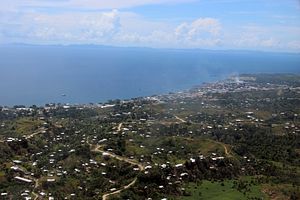After the relatively smooth election campaign in the Solomon Islands earlier this month — the first election since the withdrawal of the Regional Assistance Mission to Solomon Island (RAMSI) peacekeeping forces — the hope was that the post-election period would be similarly calm. Unfortunately, after the newly-elected legislators convened to select a new prime minister, riots broke out in the capital Honiara as Manasseh Sogavare was returned for his fourth term as the country’s prime minister.
With no single party holding more than eight seats in the Solomon Islands’ 50-seat parliament, Sogavare was able to master the post-election jostling to find support in the legislature, gaining the votes of a strong majority of 34 MPs. However, due to the lack of a strong party system in the country — most MPs are independents — there is no clear vision politicians are able to present to the public, and no clear electoral mandate to accompany it. This makes the process by which the prime minister is selected by the legislature a complex and opaque one. That has regularly bred anger and frustration within society.
This frustration also seems to be due to the lack of control Solomon Islanders feel they have over the decisions in the country. The is especially evident among the young population with limited opportunities. They focused their anger during the rioting at Honiara’s Chinatown district. Chinese businesses have come to dominate the logging, mining, and fishing industries in the country, and a significant retail presence in the capital provided a symbolic target for those disgruntled with the level of foreign ownership and influence.
As Dr. Anouk Ride explained for the Australian Institute of International Affairs, riots such as these in Solomon Islands “arise at moments of key political transitions, they have specific targets, they enjoy a degree of social support and they serve a symbolic purpose.” The lumber industry especially is seen to be an area where the government and Chinese logging interests are far too close. The felling of the country’s tropical forests is proceeding at a rapid rate, and this has the potential for significant knock-on effects to local ecosystems and traditional sources of food. There is a sense that the government is ignoring the lack of sustainability in current logging practices.
Sogavare’s last term as prime minister ended abruptly in November 2017 with a vote of no confidence after unconfirmed allegations that he was receiving donations from the Chinese telecommunications company Huawei. The company had initially been awarded a contract to lay a high-speed cable from Honiara to Sydney. Sogavare’s replacement as prime minister, Rick Houenipwela, was critical of the contract with Huawei, and didn’t require much pressure to cancel the deal when Canberra deemed the prospect unacceptable.
The Solomon Islands remain one of six Pacific Island states that recognize the sovereignty of Taiwan. Yet despite the lack of diplomatic relations with Beijing, China is the Solomon Islands’ largest trading partner, and its growing presence is keenly felt. Beijing has recently stepped up its lobbying in attempt to pry diplomatic partners away from Taipei. China has also been attempting to convince the Pacific Island Forum (PIF) — the premier regional multilateral framework — to adopt a One China policy. Prior to the Solomon Islands election, a review of the relationship with Taiwan was being conducted. Sogavare has remained on the fence in recent days.
The opportunities for trade with Chinese companies and much-needed wealth creation for the country are obvious. But much of this trade and local Chinese presence seems to be fueled by, and enmeshed with, cronyism and corruption within the government. As a result, people with limited resources to compete have found themselves faced with a new, large, powerful, and often impersonal force entering the country that they have little control over. A public display of this frustration was the result.
This is not to suggest that trade with China is bad for the Solomon Islands, but when the public feels disconnected from new forces, and feels that the country’s existing institutions are complicit in suppressing their agency, then the impact of a rising regional power like China can be destabilizing. Sogavare’s election as prime minister by the legislature seems to have been symbolic of this lack of public agency in the face of powerful new forces. How he proceeds in the role and attempts to restore some faith in the country’s institutions will be the test of his next term as prime minister.

































